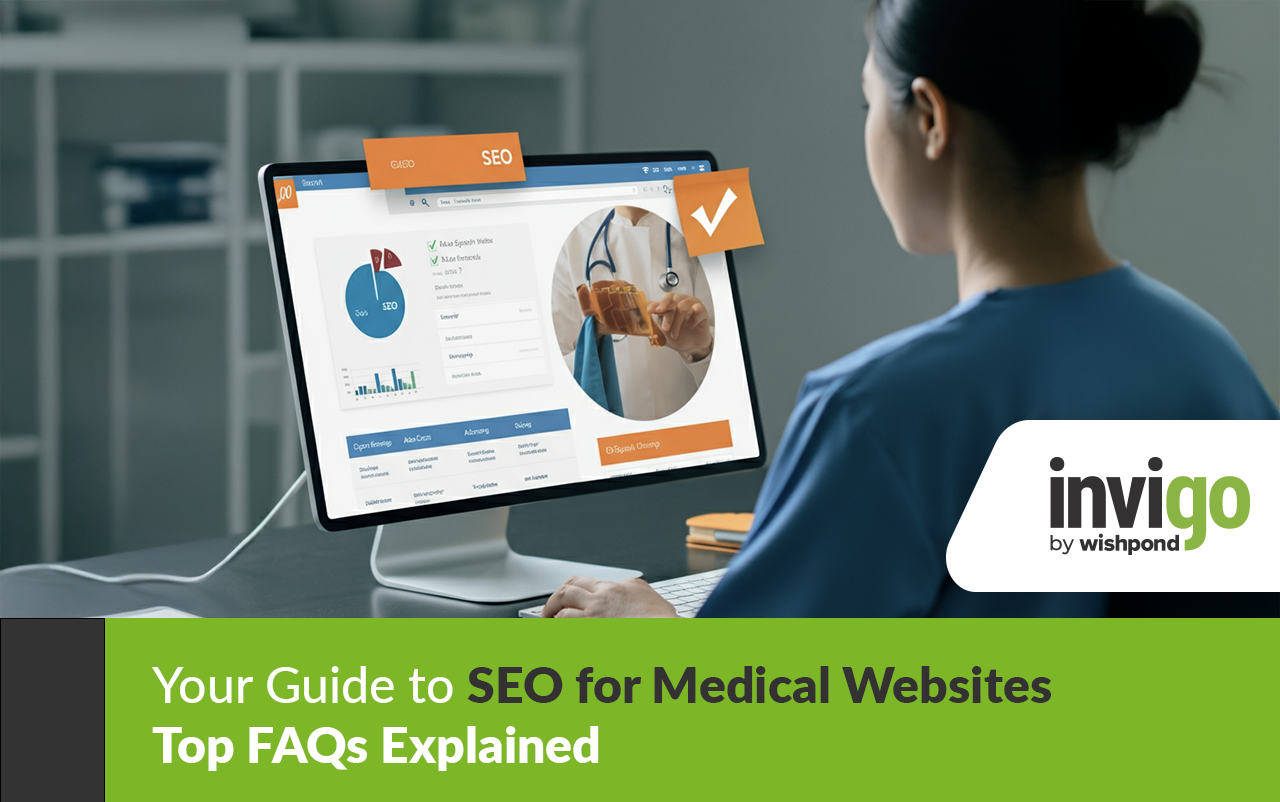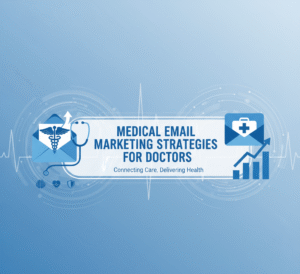“Get answers to your top questions about SEO for Medical Website. Learn how to attract more patients, improve rankings, and boost your online visibility.”
In today’s digital age, a strong online presence is crucial for medical professionals. Search Engine Optimization (SEO) is the key to unlocking that presence, helping you connect with more patients, improve your search engine rankings, and boost your overall online visibility. This guide addresses medical professionals’ most common questions about optimizing their websites for search engines, providing actionable insights to elevate their online strategy.
Understanding the Importance of SEO for Medical Websites
In today’s digital landscape, the internet has become the first port of call for individuals seeking health information and medical services. When a potential patient experiences a symptom, needs a specialist, or is simply looking for a new primary care physician, their initial reaction is often to turn to search engines like Google. This fundamental shift in how people seek healthcare underscores the critical importance of Search Engine Optimization (SEO) for medical websites. It’s no longer enough to have a website simply; it must be easily discoverable by those needing your expertise.
Attracting More Patients:
SEO acts as a powerful magnet, drawing in potential patients who are actively searching for your medical services. Think about it: when someone searches for “best dermatologist near me” or “treatment for knee pain in [your city],” they are expressing a clear need. Effective SEO ensures that your website appears prominently in these search results. This isn’t just about random clicks; it’s about connecting with individuals actively seeking solutions to their health concerns. By optimizing your website with relevant keywords that match patient search queries, you position yourself directly in front of your target audience at the precise moment they are looking for help. This targeted approach is far more effective than traditional marketing methods that cast a broader, less focused net. Furthermore, SEO allows you to reach patients who might not be aware of your practice through conventional advertising, expanding your reach into new patient demographics. A well-executed SEO strategy translates directly into a consistent stream of qualified leads and new patient appointments.
Improving Search Engine Rankings:
Higher rankings on search engine results pages (SERPs) are directly correlated with increased visibility and, consequently, more traffic to your website. Studies consistently show that most searchers click on one of the top few results. If your website languishes on page two or beyond, you miss out on a significant pool of potential patients. Achieving higher rankings is a multifaceted process that involves optimizing various aspects of your website, including its content, structure, technical performance, and authority. Search engines like Google use complex algorithms to determine which websites are most relevant and trustworthy for a search query. By adhering to SEO best practices, you signal to these algorithms that your website is a valuable resource for users. This improves your position in search results and builds trust and credibility in the eyes of potential patients. A website that consistently ranks high for relevant searches is perceived as a reputable and authoritative source of medical information and services source.
Boosting Online Visibility:
In today’s competitive healthcare market, simply existing online isn’t enough. You need to be visible. SEO significantly expands your online footprint, making it easier for individuals to find you regardless of how they are searching. This encompasses both traditional keyword searches and voice, local, and image searches. A comprehensive SEO strategy ensures that your practice appears in various online contexts, increasing brand awareness and recognition. This enhanced visibility translates into more opportunities for potential patients to learn about your services, read testimonials, and ultimately, choose your practice for their healthcare needs. Moreover, increased online visibility can lead to indirect benefits, such as attracting referrals from other healthcare providers or being featured in local online publications. By optimizing your online presence strategically, you transform your website from a static online brochure into a dynamic and powerful tool for patient acquisition and practice growth.
Key SEO Strategies for Medical Professionals
A successful SEO strategy for medical professionals requires a multi-pronged approach, addressing various aspects of your online presence. Here’s a more detailed look at each key strategy:
Keyword Optimization:
At the heart of SEO lies keyword optimization—identifying and strategically using potential patients’ words and phrases when searching for medical services online. This goes beyond simply listing standard medical terms. It involves in-depth research to understand the search volume, competition, and user intent behind different keywords.
- Broad Keywords include “cardiologist” or “physical therapy.” While they have high search volume, they are also highly competitive.
- Long-Tail Keywords: These are longer, more specific phrases like “sports medicine doctor for ankle sprain in [your city]” or “what are the symptoms of sleep apnea.” These have lower search volume but often indicate a higher level of intent and can attract more qualified leads.
- Local Keywords: Incorporating location-based terms like “[specialty] in [your neighborhood]” is crucial for attracting local patients.
Effective keyword optimization involves integrating these targeted keywords naturally into your website’s content, page titles, meta descriptions, headings, and image alt text. It’s about balancing using relevant terms and creating readable, valuable content for your audience. Tools like Google Keyword Planner, SEMrush, and Ahrefs can assist in identifying the most effective keywords for your practice.
Local SEO for Healthcare:
For most medical practices, attracting local patients is a primary goal. Local SEO optimizes your online presence to rank higher in search results, such as Google Maps and local business directories. Key elements of local SEO for healthcare include:
- Google My Business (GMB) Optimization: Claiming and fully optimizing your GMB listing is paramount. This includes providing accurate and up-to-date information about your practice name, address, phone number (NAP), website, hours of operation, services offered, and photos. Regularly posting updates, responding to patient reviews, and utilizing GMB’s features like appointment booking and Q&A can significantly boost your local visibility.
- Local Citations: Listing your practice on relevant online directories like Yelp, Healthgrades, Vitals, Zocdoc, and industry-specific directories helps establish your local presence and builds trust with search engines. Ensure your NAP information is consistent across all citations.
- Local Link Building: Obtaining backlinks from local websites, such as community organizations, local news outlets, and other local businesses, can further enhance your local SEO efforts.
- Patient Reviews: Positive online reviews are a crucial ranking factor in local search and significantly influence potential patients’ decisions. Encourage satisfied patients to leave reviews on your GMB profile and other relevant platforms. Actively monitor and respond to positive and negative reviews professionally and on time.
Content Development:
High-quality, informative content is the cornerstone of any successful SEO strategy. By creating valuable content that addresses your target audience’s health concerns, questions, and needs, you establish yourself as a trusted authority in your field and attract organic traffic to your website. Compelling content for medical websites can include:
- Blog Posts and Articles: Covering a wide range of health-related topics relevant to your specialty, providing insights, answering common questions, and offering practical advice.
- Service Pages: Detailed descriptions of your medical services, highlighting their benefits and addressing patient concerns.
- FAQ Pages: Answering frequently asked questions about your practice, procedures, and conditions you treat.
- Patient Testimonials and Case Studies: Sharing positive patient experiences can build trust and credibility.
- Videos and Infographics: Engaging visual content can explain complex medical information in an accessible way.
All content should be well-researched, accurate, easy to understand, and optimized with relevant keywords. Regularly creating and updating your website with fresh, valuable content signals to search engines that your site is active and a reliable resource.
Website Performance:
A website that is slow, difficult to navigate, or not mobile-friendly can significantly hinder your SEO efforts and frustrate potential patients. Search engines prioritize websites that offer a positive user experience. Key aspects of website performance include:
- Page Speed: Optimizing images, leveraging browser caching, and using a content delivery network (CDN) can improve your website’s loading speed.
- Mobile-Friendliness: It is crucial to ensure your website is responsive and adapts seamlessly to different screen sizes, as many online searches now occur on mobile devices. Google prioritizes mobile-first indexing, which primarily crawls and indexes your website’s mobile version.
- Website Structure and Navigation: A clear and intuitive website structure with easy-to-understand navigation helps users find the information they need quickly and efficiently. This also helps search engine crawlers understand and index your website effectively.
- HTTPS Security: An SSL certificate (HTTPS) is essential for website security and a minor ranking factor.
Backlink Building:
Backlinks are links from other reputable websites to your website. They act as “votes of confidence” in the eyes of search engines, indicating that your website is a credible and authoritative source of information. Acquiring high-quality backlinks from relevant and authoritative websites can significantly boost your website’s authority and improve your search engine rankings. Strategies for backlink building include:
- Creating High-Quality Content: Valuable content is more likely to be linked to by other websites.
- Guest Blogging: Writing articles for other reputable medical or health-related websites with links to your site.
- Networking with Other Professionals: Building relationships with healthcare providers and organizations can lead to potential linking opportunities.
- Submitting to Relevant Directories: Listing your website in reputable medical and business directories.
- Earning Unlinked Mentions: If your practice is mentioned on another website without a link, contact us and request one.
Focus on acquiring quality backlinks from authoritative sources rather than pursuing a high quantity of low-quality links, which can harm your SEO.
Online Reputation Management:
In the healthcare industry, trust and credibility are paramount. Your online reputation, as reflected in patient reviews and ratings, can significantly impact potential patients’ decisions. Effective online reputation management involves:
- Monitoring Online Reviews: Regularly track reviews on platforms like Google My Business, Healthgrades, Vitals, Yelp, and other relevant sites.
- Responding to Reviews: Address both positive and negative reviews professionally and promptly. Thanking patients for positive feedback and addressing concerns constructively in negative reviews demonstrates your commitment to patient satisfaction.
- Encouraging Reviews: Gently encourage satisfied patients to leave online reviews. This can be done through follow-up emails or in-office reminders.
A positive online reputation attracts new patients and signals to search engines that your practice is trustworthy and reputable.
Social Media Presence:
While social media might not directly impact search engine rankings, it plays a crucial role in building brand awareness, engaging with potential patients, and driving traffic to your website. By sharing valuable health information, engaging with your audience, and promoting your services on relevant social media platforms, you can:
- Increase Brand Visibility: Reach a wider audience and build brand recognition.
- Drive Website Traffic: Share links to your website content and service pages.
- Engage with Potential Patients: Answer questions, address concerns, and build relationships.
- Share Valuable Content: Position yourself as a trusted source of health information.
A consistent and engaging social media presence can indirectly contribute to your SEO success by increasing brand awareness and driving referral traffic to your website.
By implementing these key SEO strategies comprehensively and consistently, medical professionals can significantly improve their online visibility, attract more patients, and ultimately grow their practice in the digital age.
Invigo Media: Your Partner in Medical SEO
Invigo Media specializes in providing tailored SEO solutions for medical professionals. With a deep understanding of the healthcare industry, Invigo Media can help you:
- Develop a customized SEO strategy: Tailored to your specific needs and goals.
- Optimize your website for relevant keywords: Ensuring you attract the right patients.
- Improve your local SEO presence: Making it easier for local patients to find you.
- Create high-quality content: Engaging and informative content that resonates with your target audience.
- Build high-quality backlinks: Boosting your website’s authority and rankings.
- Track and analyze your SEO performance: Providing regular reports and insights.
Conclusion
In today’s digital healthcare landscape, SEO is essential for connecting with patients and growing your practice. Implementing the right strategies increases your online visibility and attracts individuals seeking your services. While SEO requires consistent effort, time, and enhanced credibility, it is significant. rewards
A specialized partner like Invigo Media offers valuable support. For medical professionals navigating SEO complexities, their expertise in the healthcare sector ensures tailored strategies aligned with your goals, allowing you to focus on patient care. At the same time, they handle the technical aspects and deliver measurable results.
Ultimately, embracing SEO is about making your services accessible, building trust online, and fostering the growth of your practice. Strategic planning and the right partnership, such as with Invigo Media, are key to achieving your online goals and realizing your digital potential in healthcare.
SEO for Medical Website FAQs
What is SEO, and why is it essential for medical websites?
SEO (Search Engine Optimization) improves your website’s visibility on search engines like Google. It’s crucial for medical websites because it helps potential patients find you when they search for healthcare services online. A strong SEO strategy leads to higher search engine rankings, increased website traffic, and more patients.
How does local SEO benefit my medical practice?
Local SEO focuses on optimizing your online presence for local searches. This is vital for medical practices as most patients seek services within their geographic area. Local SEO tactics include claiming your Google My Business listing, listing your practice on local directories (like Yelp and Healthgrades), and encouraging patients to leave online reviews. These efforts improve your visibility in local search results and attract nearby patients.
What are the key elements of on-page SEO for medical websites?
On-page SEO involves optimizing the content and structure of your website to improve its search engine rankings. Key elements include:
- Keyword Optimization: Using relevant keywords in your page titles, headings, and content.
- High-Quality Content: Creating informative, engaging content that addresses patient needs.
- Mobile-Friendliness: Ensuring your website is easily accessible and functional on mobile devices.
- Website Speed: Optimizing your website’s loading speed for a better user experience.
- Straightforward Navigation: Making it easy for visitors to find the information they need.
How do I check the SEO performance of my website?
You can use various tools and metrics to track your SEO performance:
- Google Analytics: Monitors website traffic, user behavior, and conversions.
- Google Search Console: Provides insights into your website’s performance in Google search results.
- Keyword Ranking Tools: Track your website’s ranking for specific keywords.
- Backlink Checkers: Analyze your website’s backlink profile.
What factors influence my website’s search engine rankings?
Several factors affect your website’s rankings:
- On-Page SEO: Optimizing your website’s content and structure.
- Off-Page SEO: Building backlinks and managing your online reputation.
- Technical SEO: Ensuring your website is technically sound and accessible to search engines.
- User Experience: Providing a positive experience for website visitors.
- Mobile-Friendliness: Making your website accessible on mobile devices.
- Website Speed: Ensuring quick loading times.
How can I build high-quality backlinks to my medical website?
Building high-quality backlinks is crucial for improving your website’s authority and search engine rankings. Strategies include:
- Creating valuable content: High-quality content naturally attracts backlinks.
- Guest blogging: Writing articles for other reputable websites in your industry.
- Networking with other professionals: Building relationships and seeking opportunities for collaboration.
- Submitting to directories: Listing your website in relevant online directories.
What role does content marketing play in medical SEO?
Content marketing is essential for medical SEO. Creating informative and engaging content, such as blog posts, articles, and videos, helps you attract and retain patients. It also establishes your expertise and improves your search engine rankings.
How often should I update my website’s content for SEO?
Regularly updating your website’s content is crucial for maintaining good SEO. Aim to publish new content frequently, such as blog posts, news updates, and articles. This keeps your website fresh and relevant in the eyes of search engines.
What are some common SEO mistakes to avoid?
- Keyword stuffing: Overusing keywords can harm your rankings.
- Ignoring mobile-friendliness: A non-mobile-friendly website will lose rankings.
- Neglecting local SEO: Missing out on local search traffic.
- Poor website speed: Slow loading times frustrate users and hurt SEO.
- Ignoring content quality: Low-quality content won’t rank well.
How long does it take to see results from SEO?
SEO results typically take time. It can take several months to see significant improvements in your search engine rankings and website traffic. Consistency and patience are key.













